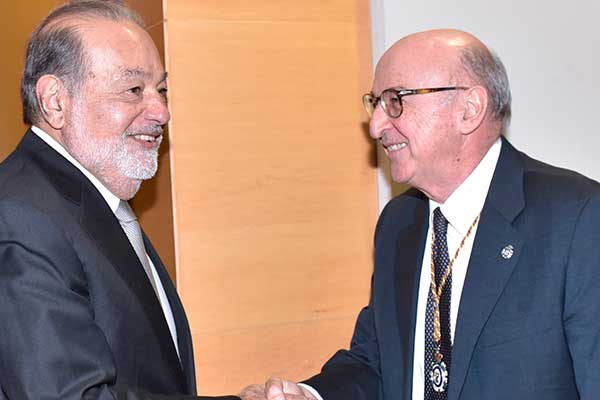Member of Spain's Royal Academy of Engineering
- Mexican engineer and entrepreneur Carlos Slim has been inducted as a Corresponding Member of Spain's Royal Academy of Engineering
- His induction address entitled "Engineering and social transformation"

Mexican engineer Carlos Slim Helú has been inducted today into the Spanish Royal Academy of Engineering as a Corresponding Member in a solemn act at the Academy's headquarters which was attended by leading figures in Spanish and Mexican academia, business and politics. Responding to Mr Slim's inaugural address, fellow academician Dr Aníbal Figueiras Vidal gave a laudatio entitled "Engineering and social transformation". Mr Slim, who is known as "the Engineer", said that the appointment "encourages me to continue working intensely in this profession, whose value is universal".
Dr Elías Fereres, President of the Academy, said that it is an honour for academy to have Carlos Slim as a member, since he is not only an engineer but also a successful businessman who epitomises the link with excellence in engineering and business in Mexico.
"His induction into the Royal Academy of Engineering will forge closer bonds with our sister country, and very particularly with the Academies and other professional bodies of engineering in Mexico, at a time when the Spanish Academy is hosting CAETS 2017, this year's meeting of the International Council of Academies of Engineering and Technological Sciences, which will make Madrid the world capital of engineering at the end of this year."
During his address, Carlos Slim noted that "engineering and technology have driven the progress of human society since Paleolithic times, through the production of tools for gathering, hunting and fishing." He added that "after 10,000 years, it was engineering that initiated the political and social transformation," and that "thanks to science, engineering and technology, the whole world experienced an enormous transformation in the social, political and economic dimensions during the 20th century."
The newly-inducted academician noted that "in this technology-based tertiary civilisation characterised by services, digital, information and knowledge, in a changing and competitive world in which traditional activities are now done differently using technology, goods are produced and distributed efficiently at low cost, and new economic and recreational activities are arising, there is a need for skilled and qualified personnel but, above all, people must have sufficient income and leisure to create a feedback loop for development." He concluded by saying that "engineering will continue to experience constant transformation and to make society better."
Carlos Slim completed his studies of civil engineering in the early 1960s at the Engineering School in the National Autonomous University of Mexico (UNAM); interestingly, he taught Algebra and Linear Programming at the university while completing his degree. That is, as set out in his official bio (http://www.carlosslim.com/biografia_ing.html), he was simultaneously a student and a professor.
Since 1965, the newly-inducted academician has created, acquired and developed leading companies in the areas of finance, telephony, construction and mining, among others, which have contributed greatly to development and employment in Mexico, Latin America, the United States and the rest of the world. In Spain, Carlos Slim entered into a productive partnership with Esther Koplowitz in the FCC Group in 2014, under which he attained 61% of the company's capital in 2016. With a 115-year history, FCC is a world-leading supplier of citizen services (water, environment, infrastructure, cement and real estate) and has been operating in Mexico since 1994. Since then, the company has contributed to expanding Mexico's infrastructure by working on public- and private-sector projects in all areas of civil engineering and building and on developing concession projects.
Carlos Slim is renowned worldwide not just for his status as an entrepreneur: he is also known for his philanthropy. In 1986, he created the Carlos Slim Foundation in order to help the most vulnerable communities and contribute to enhancing people's living standards through education, healthcare and employment programmes, among others.
In 2015, the Carlos Slim Foundation was named by Forbes as Mexico's most charitable business foundation, and it received the Texas Children's Hospital International Recognition Award 2015 for its work in favour of health around the world. That same year, Mr Slim received the UNESCO Medal in Paris for his contribution to harnessing the power of information and communication technologies for the benefit of all of humanity.
Mr Slim has received many other awards, including the Medal of Honour for Business Merit from the Mexico City International Chamber of Commerce in 1985 and the George Washington University President's Medal for his business and humanitarian leadership; he has also been decorated by the governments of Belgium and Lebanon. The International Telecommunication Union (ITU), an agency of the UN, awarded him the World Telecommunication and Information Society Award 2014 in recognition of his leadership and dedication to the development of information and communication technologies and broadband connectivity as a means of achieving sustainable development.
The following phrases are a small sample of Carlos Slim's philosophy of life:
- Support the development and promotion of engineering and innovation in order to enhance business competitiveness and create new sources of employment, reduce poverty and improve the cities where we live.
- A job well done is not just a responsibility to oneself and to society, but also an emotional need.
- Technology development puts nations in the lead.
- Technology doesn't create gaps; rather, it creates bridges, but it's up to us to cross them.
- Telecommunications is the nervous system of this new civilisation; it is fundamental for any country's growth and development.
- An entrepreneur is a temporary manager of wealth.








